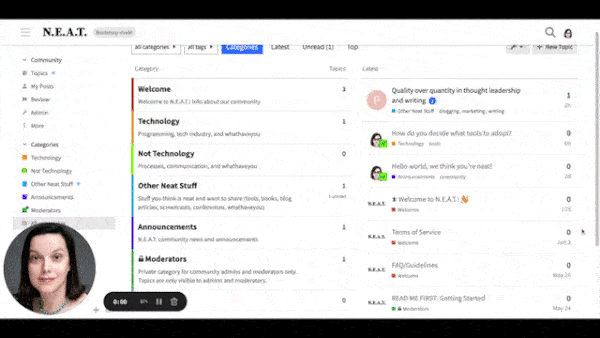Earlier in the Sales Enablement: Good or Bad series, I shared why I'm working to build a community. In this article, I'm going to share a bit more tactically about the how.
First Considerations: The Medium Shapes Your Community
There's an embarrassment of riches when looking to set up an online community these days. Christopher Penn gave a super helpful presentation on private social media communities at B2B Forum last fall. His No.1 suggestion was to pick the medium that makes sense for you and your community.
In many contexts, that is Slack or Discord.
For marketing communities, I've experienced Slack the most often, free and paid versions alike.
The No.1 drawback of a free Slack community? Messages disappear after 90 days like amateur Houdinis. All of them!
The No.1 drawback I've noticed in my limited Discord experience? Interactions devolve into not-great-behavior really quickly.
Other considerations emerge after you make your selection and you're find yourself in the never-ending story of settings. But up front, money is the big consideration. And that brings up another question: Is it sustainable?
Discord has an advantage: It's technically free. (There are also Nitro subscriptions, which are paid. Yes, it's confusing.) But you "pay" in the form of the time it takes to moderate and keep things civil.
Slack is familiar to many; but because it's been adopted by so many companies, it has enterprise-minded pricing for the paid version. If we were to establish even a small, active community of 200 members (including our 100 staff and 100 community folks), how much would that cost?
The lowest Pro paid level is $7.25 per user per month when billed annually and $8.25 per user per month when billed monthly. I have no way of knowing exactly how many people we'd have, and the community would scale over time. So $8.25 per user per month x 200 users would be $1,650 per month. Presumably before taxes. That's really expensive for a small-to-midsize B2B services company's marketing budget.
So, regardless of how those numbers change in the future, Discord and Slack are both resource-intensive.
I started to resign myself to our free version of Slack's turning into a "Sad Panda" community as the messages disappeared into the ether and people stopped participating completely. No joke, that happened to a really cool marketing community in 2022.
Then someone told me about Discourse.
When I started exploring Discourse, I discovered multiple benefits when viewed through the lens of a community focused on people working in and around software development:
- It's open source.
- It has both self-hosted and paid options.
- It allows for scaling to higher levels over time.
- It's relatively easy to shift from self-hosted to paid, and vice-versa
The best part? The paid version is only $100 a month. That I can live with. That is sustainable.
The Right Answer—For You
Sometimes the answer is to go with the obvious choice. But not an obvious choice for everyone, an obvious choice for you.
I was reminded of that while watching Nicolas Cage in Kick-Ass. I had a moment when I couldn't name which Batman Cage was emulating—because it was so good and so specific. It took me a hot minute, and then I remembered watching Adam West on reruns as a teenager.
For Nicolas Cage, the obvious choice was not the gravelly voice adopted by so many Batmen over multiple decades. It was the staccato, halting rhythm that is a little absurd but oh-so-effective in tying the Batman-inspired Big Daddy to Batman's comic book roots.
The 1960s Batman TV series felt like a comic book come to life, and West's interpretation of Batman felt very much the same. By now, you're probably coming to appreciate that Cage tends to go for acting approaches that aren't obvious to others but make immediate sense to him (more on that next month when we talk about The Challenger Sale!).
In our specific context, a hosted Discourse community is the obvious choice—for us!
Community Architecture: Four Ways to Make Things Easier on Community Members

In software development, architecture is how you organize or reason about a system. You probably already understand that, thinking about how architects design and create schematics for a physical building. They have to understand how everything works together to map out how to build it.
The same is true for online communities. Although Web applications like Discourse make the actual building easy, there are still a lot of settings you're going to need to wade through.
The key is thinking globally before you get into the settings. What are you trying to accomplish with your community?
1. Consider the number of categories you can get away with
In Discourse, as people create topics (AKA posts), they label them with a title and can optionally apply tags. So you can get away with broad categories and let the tags do the heavy lifting. It's a beautiful thing because it enables really stellar search. And, if you opt for a fully public community, your content becomes search-engine indexable.
2. Consider your global community settings
As you review settings, consider what you're setting globally for the whole community while also understanding what individual users can adjust for themselves. That is especially important for notifications.
3. Consider your ground rules and guidelines
Discourse provides recommendations, but you'll also want to consider incorporating anything specific to your own company's code of conduct, values, and culture
Depending on the platform you're using, there may be terms and conditions as well as a data privacy policy that already apply. It's a good idea to point that out to your community, as there may be details outside of your control—which is not a bad thing, as it reduces the risk to your company. But it's always a good idea to be transparent about it.
4. Recruit administrators and moderators
Some communities opt to allow community members who are active for an extended period of time to become volunteer moderators. In my community, we're starting out with moderators from our staff who want to give back, and spreading out the responsibility so it's not overly time-consuming for any one person.
* * *
So, if you know any folks who work in and around software development who believe not everything's about technology, do me a solid and share our community wait list with them.
More Resources on Community-Building
Communities Are the Future of Marketing | Marketing Smarts Live Show
The Case for Community-Based Marketing
The Importance of B2B Communities: What's in It for Marketers?




